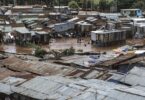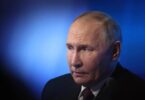F.P. Report
BRUSSELS: The EU Dev-elopment Ministers met on Friday, with two items on the agenda. The first one was the global food security crisis. The second one was a meeting with Filippo Grandi [United Nations High Commissioner for Refugees] to assess the situation of the refugees around the world, not only from Ukraine – also from Ukraine – without forgetting other refugee crises. A-nd we, the European Union, are supporting the [United Nations] High Commissi-oner for Refugees, said High Representative/Vice-President Josep Borrell at the press conference
The first was the discussion among Ministers about the looming global food security crisis. The food market was already under stress before the war, but after the Russian attack against Ukraine, this crisis is becoming much worse. And today, it endangers the food security of millions of people in many parts of the world.
The Russian troops are bombing Ukrainian fields, not allowing for sowing of crops, looting food stocks and blocking Ukraine’s po-rts, and therefore increasing prices for food and fertilizers – they have skyrocketed in many parts of the world.
So, the world’s food supply is in danger, mainly due to the Russian invasion of Ukraine.
And the numbers speak for themselves: Last year, [in] 2021, Russia and Ukraine were among the top exporters of cereals and sunflower seeds – and oil with Ukraine – and these were accounting about 50% of world trade of sunflower oil, just to put an example. Sunflower oil – 50% coming from Ukraine. And Russia is occupying or shelling parts of the arable Ukrainian land and it is estimated that almost half of the winter wheat, almost 40% of rye and more than 60% of corn, to be harvested in summer 2022, is situated in zones that are at risk. So, these future crops will also be at risk. Betw-een 20% and 30% of the areas of winter cereal, mai-ze and sunflower seed production in Ukraine will ei-ther remain unharvested or not be planted this spring. This is to give an idea how much [the] Ukrainian agricultural capacity will be damaged by the war.
The consequence of that is that food is missing and will be missing. And where it is not missing, it is expensive – much more expensive than many people can afford. If they spend more resources on food, they have less for education and health, this will deepen poverty and inequalities.
It is clear that the first victims will be vulnerable populations around the world, particularly in low-income countries who depend on food and fertilizer imports. As I said, the situation was already very bad before the war on Ukraine. An estimated 193 million people in 53 countries were facing acute food insecurity. And [if] you have a look at the figures, especially in the Horn of Africa where people can die from starvation – in Ethiopia in particular, and [in] all the Horn of Africa, the figures are really terrifying. But now the war has turned it into a full[-on] crisis, and the need for a global response from the global community has been under debate today with the Ministers.
We have already made two pledging conferences, to support the populations in the Sahel and Lake Chad region, and the other on the Horn of Africa. And the European Union, with its Team Europe approach, has made important pledges to these two conferences.
We have to look for add-itional money. And for that, we need a Team Europe approach, coming from the budget of the Member States to be mobilised – because you know that the budget of the European Union cannot have a deficit. So, we can redirect, reschedule, reorient our resources, but it is on an approach of the Member States altogether that the solution can be found.
Today, we discussed about solidarity, emergency relief, to work on food affordability and macro-economic stability.
We worked on how to boost production. We will support over 70 partners in boosting output and resilience and sustainability of their food systems to increase their food capacity in the medium term.
Third, on trade. There are around 20 million tons of grains in Ukrainian silos – they are blocked by [Vladimir] Putin’s war. There are a lot of ships waiting to load this grain, and they cannot do it because the Russian navy is blocking the Ukrainian ports. That is why we are trying to look for alternative ways of taking these grains to the people. We have, at the [European] Co-mmission prepared this pr-oposal for “Solidarity lan-es”. We call for the Memb-er States to implement it quickly. And we call also to our partners not to restrict global trade of agricultural products and inputs.
Finally, to work on a multilateral basis, with the United Nations, the G7, the Food and Agriculture Resilience Mission (FARM) initiative, and others that could gather the efforts of everybody.
We are very much aware that after the “mask diplomacy” – remember, at the beginning of the COVID-19 pandemic – and then the “vaccine diplomacy”, now we are entering into a period of “food diplomacy”.
And we have to fight a new additional battle of narratives to counter the Russian disinformation machine that tries to convince the world that the rise in the price of food is a consequence of the sanctions imposed on Russia. On the contrary, this is not the sanctions. This is a false claim from Russia, it is the war itself which is producing this food crisis and its high price increases. Our sanctions do not counter food, do not counter agricultural products, do not counter fertilizers. We do not prevent Russian exports on these things, because we knew they could affect the world market of food and fertilizers. This has to be clear, because the Russians insist – once and again – [on the fact] that the price peak is a consequence of the West’s sanctions against them. No, the tensions in the markets are consequences of the war that Russia is waging against Ukraine.
But we have to do more than to try to explain it. We have to present a plan in order to deal with the geopolitical consequences of this war, and we will do it at the next Foreign Affairs Council in June. And I am sure that the European Union Council will also deal with that at their next meeting.
After this exchange on the food insecurity crisis, we had the opportunity to exchange with the United Nations High Commissioner for Refugees, Filippo Grandi. It was the first time that Filippo was coming to the Foreign Affairs Council in the Development formation. We had, thanks to him, an overview of the global situation on refugees around the world. One year ago, there were 84 million forcedly displaced persons, and according to the latest data that Filippo Grandi provided to us, we are reaching the red line of 100 million people forced to leave their homes, displaced around the world for many different reasons – from climate change to political instability, from war to hunger. 100 million people are more than the population of Germany, this is the population of Egypt.
[The] United Nations High Commissioner for Refugees is a key partner for us, for the European Union and the Member States also. We are the second largest donor to UNHCR. And we have seen how humanitarian needs are at an all-time high. The needs are growing much quicker than the generosity. Already in February this year they were high, at the peak. And then came the Ukrainian war, which added 6 million refugees out at the Ukrainian border, and 7-8 million inside [the] Ukrainian [border]. So, this is why we are reaching the [bar of] 100 million people. And everybody is looking at the refugees coming from Ukraine, at least from the European perspective, but the situation is not improving – on the contrary, it is worsening in many places of the world, as Filippo [Grandi] has explained to us, from Afghanistan, to Myanmar, to the Horn of Africa. The amount of needs is increasing and this will put a strong strain on our capacity to continue supporting financially these people. This will require once again to work on a joint Team Europe response.
The consequences of this situation have to be faced by the European Union budget but also, and mainly, by the European Union Member States.
The gap between the available resources will continue to expand. We must step up our efforts to shrink the needs and to become more efficient in delivering aid, but there is a strong need to scale up the resources available. And that we have been discussing today with a lot of preoccupation, because we know that the situation can create political instability and turmoil. And not to pay the price today of avoiding these crises, can come with a higher price tomorrow if these crises develop.






